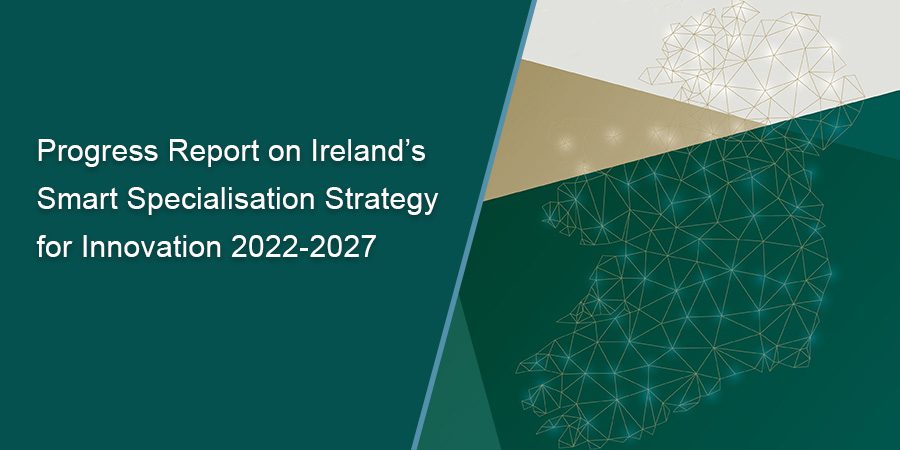Progress report outlines work underway to address regional innovation gaps and opportunities
The Minister for Enterprise, Tourism and Employment, Peter Burke TD, today published the first Progress Report on Ireland’s Smart Specialisation Strategy for Innovation 2022-2027.
The Minister said:
“I am pleased to publish this first progress update on Smart Specialisation which reports on important initiatives that will strengthen regional enterprise and innovation, including investment in our technological universities, our knowledge transfer facilities, and our innovators of tomorrow in areas such as cybersecurity and digital health.
Our Smart Specialisation Strategy is about ensuring that Ireland’s regions are innovative and sustainable and playing to their strengths, laying the foundations for future enterprise growth. The strategy has helped to target our European Regional Development Fund (ERDF) programmes towards strengthening our regions’ innovation capacity.”
Ireland’s Smart Specialisation Strategy for Innovation is led by the Department of Enterprise, Trade and Employment (DETE), working with other government departments and agencies at national, regional and local level.
With the support of the European Regional Development Fund (ERDF) and exchequer match funding, Ireland has successfully launched smart specialisation initiatives to accelerate digital transformation, green innovation, and industry-academic collaboration over the coming years, that will reinforce our position as a European leader in research and development, as well as support regional and national economic competitiveness. Outlined in the progress report are updates on:
- Launch of the Smart Regions Enterprise Innovation Scheme (SREIS): that will invest in enterprise infrastructures and programmes aligned with regional strengths, in particular those areas identified as priorities in the Regional Enterprise Plans.
- Strengthening Ireland’s R&D Capacity: the Knowledge Transfer (KT) Boost programme will enhance research collaboration between technological universities and industry, leading to spin-out companies and new commercial innovations.
- Developing Future Skills for Innovation: the Research Ireland Accelerating Research to Commercialisation (ARC) Hub Programme and Enterprise Ireland’s Innovators’ Initiative are nurturing the next generation of skilled entrepreneurs, researchers, and technology leaders in important sectors for Ireland.
- Ireland’s Regional Innovation Valleys Designation: in June 2024, Ireland’s three NUTS 2 regions were designated as Regional Innovation Valleys, joining a European network focused on strengthening collaboration between high-performing and emerging innovation regions.
- The Smart Specialisation National Implementation Group, established in December 2022, oversees the alignment of regional strategies with national and EU policies, ensuring that innovation reaches all corners of the country.
- A Smart Specialisation data ‘Dashboard’ to track regional innovation performance, has been developed by the Eastern and Midlands Regional Assembly and the All-Island Research Observatory at Maynooth University, with input from the National Smart Specialisation Implementation Group and DETE. The dashboard was recently launched by Minister Burke at an Association of Irish Regions Training event in Athlone.
The Regional Assemblies are Managing Authorities for €853 million of ERDF and Irish Government co-funding that underpins key investments under the Smart Specialisation Strategy across several programmes administered by Enterprise Ireland and Research Ireland.
Director of the Northern and Western Regional Assembly Denis Kelly said:
“Ireland’s Smart Specialisation Strategy continues to strengthen the alignment between regional and national innovation efforts, tackling the country’s research, development, and innovation (RD&I) challenges. This integrated approach is putting research and innovation (R&I) at the forefront of addressing the social, economic, and environmental challenges not only within the NWRA region but across Ireland as a whole.
Director of the Southern Regional Assembly David Kelly said:
“The Southern Regional Assembly welcomes the publication of the S3 progress report. Smart Specialisation is a crucial policy to support the regional innovation ecosystem and by aligning ERDF investments and supports we will ensure that the Southern Region continues to focus on its strengths, embracing the green transition whilst remaining competitive and strong.”
Director of the Eastern and Midland Regional Assembly Clare Bannon said:
“As we navigate an increasingly fast-paced and unpredictable world, it is critical that research and innovation drivers in the Eastern and Midlands Region are supported by policies like the Smart Specialisation Strategy. These efforts ensure that the region can reach its full potential, contributing meaningfully at national, European and global levels.”

